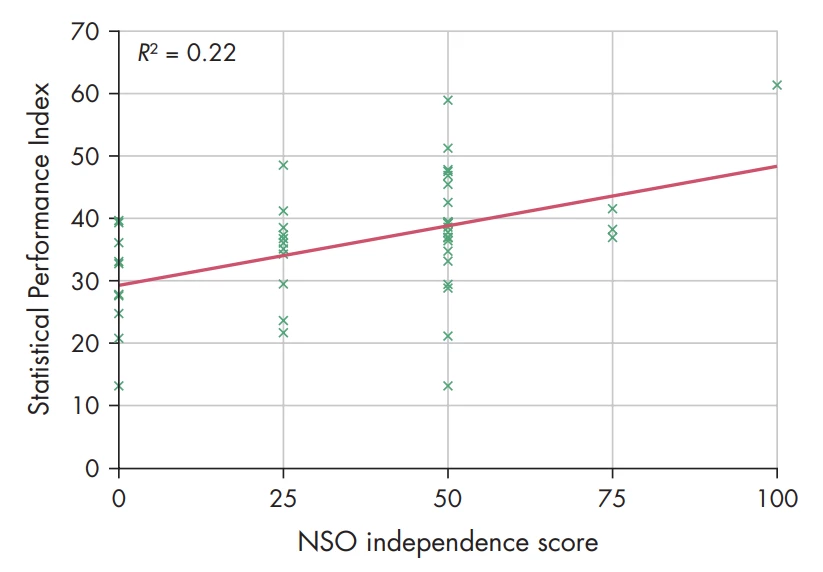
Imagine living in a country where prices doubled every 16 hours. How could an economy function in such a world where people lost faith in the value of their currency? During a period of hyperinflation in Hungary post-World War II, things got this bad. There were many factors leading to this, but one fact prevented fixing the problem—the Central Bank had no independence. Recognizing the importance of separating politics from monetary policy, there has been a strong push to make central banks independent over the past fifty years. Today, the majority of central banks across all income groups are independent and the notion that central banks ought to have some degree of independence is fairly uncontroversial. Without independence, governments might misuse their power over the money supply, cause disturbing rates of inflation, and damage long-run development outcomes.
A very similar argument can be made with respect to the independence of national statistical offices (NSOs). Whereas central banks control a country’s money supply, NSOs have traditionally controlled a large part of a country’s data supply. As pointed out in the 2021 World Development Report: Data for Better Lives, governments may have a vested interest in curtailing the production and dissemination of reliable data, fearing these could expose poor policy performance, dilute power, and increase public pressure. Without NSO independence, governments may misuse their power over the data supply that underlie official statistics and damage long-run development outcomes.
Despite the similarity of the arguments that can be made for NSO and central bank independence, a global movement towards NSO independence has not gained similar steam. An indicator in the Ibrahim Index of African Governance evaluates NSO independence based on NSOs’ autonomy to collect data of their choosing, their autonomy to publish data without prior clearance or approval from any branch of the government, and the sufficiency of their funding to collect and publish data of their choosing. A quarter of African countries satisfy zero of those conditions and only five countries satisfy more than half. Anecdotes of attacks on NSO independence around the world suggest that fragile NSO independence is not limited to the African continent. For example, Greece’s debt statistics appear to have deliberately misrepresented the country’s financial situation in the lead-up to the 2009 euro crisis.
So why has the movement for the independence of National Statistical Offices been much weaker than the push for central bank independence? This question was one of the topics covered at a recent NSO-focused World Development Report launch event, as shown below:
One reason is that the international pressure has been weaker. Whereas the IMF has played a central role in advising countries on the benefits of central bank independence, no organization has had quite a similar role in the domain of NSO independence. International organizations can boost statistical independence when independence is required for accession to international organizations or agreements. The OECD, for example, recommended that Colombia adopt a law that would make its NSO professionally independent as part of the country’s bid to join the organization. This spearheaded an institutional reform in the country. A call for NSO independence could also be more prominently integrated into development institutions’ dialogues with client countries.
Another reason why the movement for NSO independence has been weaker is that total NSO independence often risks reducing the relevance of the office. Achieving relevance for the NSO is harder when it is administratively separated from other parts of the government and does not maintain a close relationship with influential ministries such as the Ministry of Finance or Treasury or the Office of the President. Whereas no government would consider not funding an independent central bank or not using the money it supplies, governments frequently curtail funding to NSOs and refrain from using the data they supply. And without the use of its data, the NSO becomes irrelevant—incapable of informing public debate and policy.
For many NSOs, this creates a trade-off between relevance and independence, or as one prominent head of an NSO put it during interviews for the World Development Report, a struggle on “how to keep an arm’s length from the hand that feeds us.” Yet this trade-off is not inevitable, and a better understanding on the part of decision-makers of the role of high-quality data can break the negative link between the two. Here are three arguments to help foster such an understanding:
- NSO independence improves the availability and quality of data. Studying the causal relationship between NSO independence and data quality is challenging. Yet, as shown below, correlational evidence—particularly correlating the Ibrahim Index of African Governance indicator described above with the World Bank’s Statistical Performance Index—suggests that an independent NSO improves the availability and quality of data. Governments that are interested in curtailing some data would surely benefit from and make use of high-quality data in other domains. As such, high-quality data increases the use of data, which makes the NSO more relevant.
NSO independence and statistical performance
Sources: Ibrahim Index of African Governance, Statistical Performance Indicators.
The data behind the figure can be downloaded here.
- NSO independence improves market and economic conditions. Data transparency can facilitate favorable capital market and investment conditions and foster GDP growth. In particular, the signaling value of being a country that makes data widely available can help countries reduce their sovereign bond spreads and decrease their external debt burden, thereby leading to massive savings. One study found that if African countries raised their level of data transparency to the level of the top quartile of upper-middle-income countries, the region as a whole would save 4.87 basis points in sovereign bond spreads and decrease their external debt by more than 400 million dollars. Another study found that lack of data transparency in the Middle East and North Africa region hampers fiscal sustainability assessments. If NSOs can articulate the point that a well-funded independent office can help improve market and economic conditions, it is likely that they will be more relevant to the Ministry of Finance than had they not been independent.
- Government performance will be scrutinized with or without NSO independence. Governments who refrain from making their NSO independent in fear of exposing poor performance might end up being exposed by alternative data producers. The NSO has no monopoly on data supply, and civil society performs a vital function in demanding transparency and holding government accountable. Citizen-generated data can be used to challenge official statistics when their accuracy or impartiality is in question. In contrast to civil-society data producers, the government will likely have an easier time working with an independent NSO in terms of knowing about adverse data release in advance, getting an understanding of the assumptions behind the data, and being able to select high-quality data that possibly can give them an alternative yet truthful storyline. All of this makes the NSO more relevant than if it is not independent and not producing reliable data.
Ultimately, an independent NSO best informs government decision-making and increases citizens’ trust in government data and public institutions in general. Hopefully, in the coming years, a push akin to the push for central bank independence will be made for NSO independence. Such a push should not impede the relevance of the institution. Just like an independent central bank is best placed to protect the value of the country’s monetary currency, an independent NSO is best placed to create value from the country’s informational currency: data.
Read more about Chapter 2 of the report here.
To download the full report, click here.
To learn more about the World Development Report 2021, please visit this website.






Join the Conversation